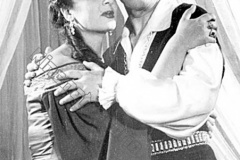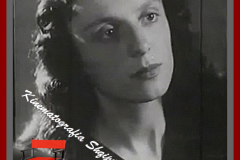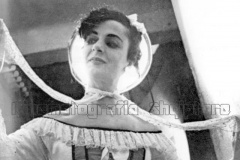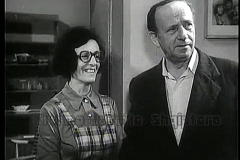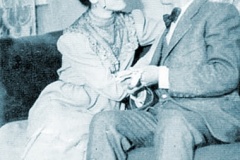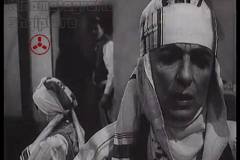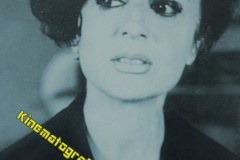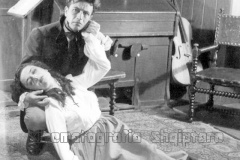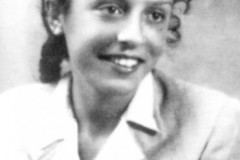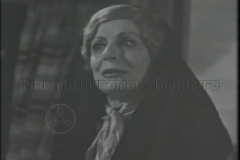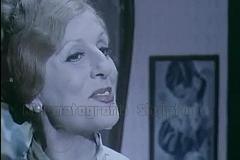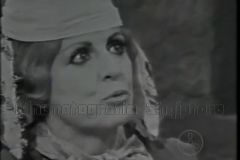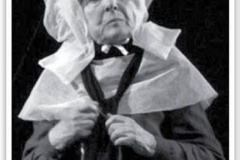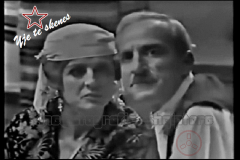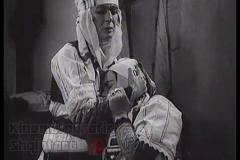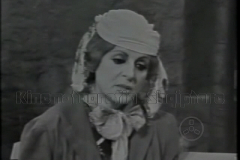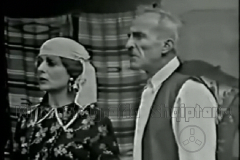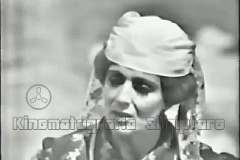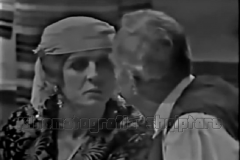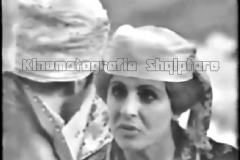Drita Pelinku, Icon of Albanian acting.
On December 3, 1926, in the villa of a large family of educated people abroad, a girl was born. They were going to christen the baby Drita (Light) who illuminated the castle detached from the reality of that time, but no one knew that a princess for Albanian art had just been born.”
“I was born in the beautiful city of Vlora… My mother named me Drita (Light) , because she hoped that this word would bring her good luck with the birth of a son, after three daughters”.
This is how the magical actress of the stage and cinema, Drita Pelinku, told. Childhood is a favorite argument for the actress who remembers this time with nostalgia. She said that she was happy in a family of 20, where the father was highly educated, graduated from Turkey and Thessaloniki, that they were rich merchants and there was nothing missing at home , starting from toys and entertainment, to ending at the beautiful old beach villa or the wooden house, among the pines of Llogora. Nothing would stop the happy flow in the family, if she had not made the decision that on a fine day, to register to become a theater actress.
“I dared and went without asking about the consequences that would come to me from the family and the mentality of the time. I am the only girl who entered the first drama school that opened in Tirana in January 1945. I was a student at “Queen Mother” where I recited beautifully. Everyone told me “Drita, you will become an artist”. In December 1944, an announcement appeared in the newspaper announcing the opening of a school which would create the embryo of a future theater, because until then there was no professional theater troupe. I appeared in this competition and won, but I was the only girl with talented boys like Naim Frashëri, Kadri Roshi, Prokop Mima, Vaso Peci and Lazër Filipi. The school was opened where the “Drini” hotel is today. Female participation in an art school was considered a violation of the moral norms of society. Social opinion condemned me, family relationships were shaken, but my dream was coming true. The school continued until the theater opened, while I was forced to leave for a few months to finish the “Queen Mother” Institute. After graduating from high school, I entered the National Theater as a professional, and this happened at the beginning of 1946″.
From that year until the moment when the health condition prevented her from reappearing on the stage for the greatest Pelinku, she had an excellent career, an Icon of the Albanian scene. Family and artistic life for the actress and director Drita Pelinku constitute a binomial, have the same birthday, because at the drama school, the young girl met the one who would later become her husband.
While her career was starting its long way, the first love clouded the feelings of the 18-year-old again because ” she was too young to become the bride of the boy she loved”, Hyseni Pelinku, a singer who graduated from the conservatory of Pesaro, ruined the plans of the actress’ father, who was planning that, like him, his daughter would study abroad. It took two years of love for her family to accept the relationship and the actress to create a new family.
“Since we had been married for two weeks, we asked not to be separated.”
This has been their whole life, together. When Hysen Pelinku passed away in 1997, the actress realized that she lost not only her husband, but also an irreplaceable friend. The common life, the efforts to cope with every difficulty, the upbringing of two daughters, one a violinist, the other a doctor, sacrifices to be not only parents, but also artists and dignified people, had connected them even more.
“Hysen was a wonderful man. I say it with full mouth and not out of nostalgia because it is no more. Throughout his life he manifested conjugal love, parental love, he was generous, a man of will, and above all he was an important column on which I relied to do the difficult work of an actor, to break taboos, but also to face the difficulties of life”.
“It should not be forgotten that, among other things, I had to face the obligations as a mother. I woke up early in the morning and stood in line to get the food for the children. At eight o’clock I ran to the theater. We had the shows in the evenings and only midnight would bring me back home. When we came back, we found the girls asleep. We never said “I’m tired”. We fought to steal the moment from life. “Not a few times we went at night after the show to the “Dajti” hotel tavern”.
Roles of Drita Pelinku. If she has to choose between theater and film, theater is the first, irreplaceable.
“The theater became my second home, because my repertoire has been very busy, from beginning to end. It includes leading and leading roles. I started with the drama “Portrait” with the role of the painter Ira, who painted the portrait of her sister-in-law, played by Liza Vorfi. Other leading roles followed, such as “Girl from the North”, which was about two lovers who had lost each other in the Second World War and who later find each other. I continued with the parts of Gordon “Servant of two masters”, with the role of the girl, Clarice, or parts of Moliere, where I had the role of Marjana with partner Naim Frashëri, and so on.
Every director who came gave me leading roles. The roles were enriched with Luiza Miller, who dreams of every actress. Later came the great Shakespearean roles, such as the queen in “Hamlet” or Cornelia in “King Lear”. I performed in “The Merry Wives of Windsor”, with exceptional partners, the great artist Mihal Popi, or the great Violeta Manushi. But the most beloved role for me remains the role of Zojcika, written by the great Romanian classic, Karagiale, where I was the only performer among 22 men. I was the Prefect’s wife, at the time of the election, but I loved another. Some important papers were lost there and this created difficulties in the family, it was the reason for not winning the elections. Everyone was fighting to find the letters, and in parts the maneuvers of this woman, who sometimes acted with intelligence and sometimes with love, are shown to escape the scandal. It is one of the roles that I loved the most out of all. I have played in most cases the role of lovers and my cleavage has not been separated in my entire life on stage”.
Photo gallery of the actress from theatrical performances:








If you start counting them, the actress plays more than 130 roles. She has been engaged all her life, both in world dramaturgy roles, as well as in national dramaturgy or cinematography roles, but with the only drawback that her youth was not reflected in cinematography, this is because of the biography.
She even remembers that for the role of the aunt in “Man with the cannon”, permission had to be obtained from the Party Committee. Among the beautiful roles in the cinema, the actress singles out the role of Buddha in the film “When the foundations were laid”, which later became synonymous with her name.
 “The main roles have followed me even at an advanced age”, says actress Drita Pelinku. Even five years ago, I had a leading role in “The Beautiful Queen”, directed by Kiço London. There I performed with artists of the next generation, but great ones of the time, such as Yllka Mujo, Ndriçim Xhepa, or the young actor, Arben Derhemi. Later still, I performed a leading role in “The Last Profession”. While now I’m closing my career with a monodrama by Martin Sherman, where I play the role of Rose. It is a very powerful role, with many colors.”
“The main roles have followed me even at an advanced age”, says actress Drita Pelinku. Even five years ago, I had a leading role in “The Beautiful Queen”, directed by Kiço London. There I performed with artists of the next generation, but great ones of the time, such as Yllka Mujo, Ndriçim Xhepa, or the young actor, Arben Derhemi. Later still, I performed a leading role in “The Last Profession”. While now I’m closing my career with a monodrama by Martin Sherman, where I play the role of Rose. It is a very powerful role, with many colors.”
Theater for Drita Pelinku.
One day in September 1946, a young 20-year-old actress was added to the theater collective. She entered the gate of the theater shy but happy. This happiness was expressed in her eyes that shone like her name, full of light. Regarding the time of the school, Pelinku himself says: “December 1944. The director of that time Sokrat Mio, graduated in France, and his assistant Andon Pano, were looking for students for the drama school. I was a student of the pedagogical school and the news attracted me I couldn’t talk to the family, I showed up without telling them anything. I was the only girl with talented boys like Kadri Roshi, Prokop Mima, and I followed the lessons for a long time that I was going to a friend. However, Tirana was small and this was discovered. In 1946, I got engaged, and it was my husband who gave me permission to continue school and theater.”
As an actress with a variety of roles, she has not forgotten to say something about their nature, and the importance and influence they had on her.
“From the beginning to the end, my roles have been either roles of loving girls, or roles of women with a big inner world, with powerful explosions, and all this has made me take care of my body, of the physical, the hair, everything these roles required.”
A very interesting moment of her memories is the interpretation of the role of Zojcika in the Romanian comedy “A lost letter”. As Pelinku confesses, she performed alone among 22 men. One of the performances was also attended by representatives of the Romanian embassy and was highly appreciated. A diplomatic lady removed a rose from her dress and placed it on Pelinku’s cleavage.
As for the cinematography, she herself says that she entered late.
“I had some problems at the time that I was not allowed. I played a small role in the movie ‘Tana’, after that problems arose that broke later, when I retired. In fact, it was Viktor Gjika and Vladimir Prifti who called me first .  Films
Films
1958: Tana
1977: Man with a Cannon as Aunt
1978: When the foundations were laid as Budja
1978: Girls with red ribbons as Mrs. Cavallero
1979: Beyond the stone walls as Ramiz’s mother
1979: Radio station (film) in the role of Mukadezi
1980: The Bride
1981: Our Common House in the role of Vita
1982: The Warm Wind of the Deep
1986: Endless Words in the role of Bardhyl’s mother
1987: The Deputy of Women
1988: Shpresa in the role of Piro’s mother
2000 : Efimeri as poli
2008: Secrets in the role of Landi’s mother
2009: Rose (Theatre)
2013: Eternal love (Theatre)
It was previously published on Facebook since 2016
_________________
Albanian Cinematography in activity since 2013
Follow us: Blog: https://albaniancinematography.blogspot.com/
Vimeo: Albanian Cinematography (vimeo.com)
Facebook: https://www.facebook.com/ksh.faqjazyrtare
Dailymotion: https://www.dailymotion.com/kinetografiashqiptareartisporti
YouTube: https://www.youtube.com/channel/UCDRYQ5xCyGkfELm3mX8Rhtw
Discover more from Albanian Cinematography - Sport
Subscribe to get the latest posts sent to your email.

